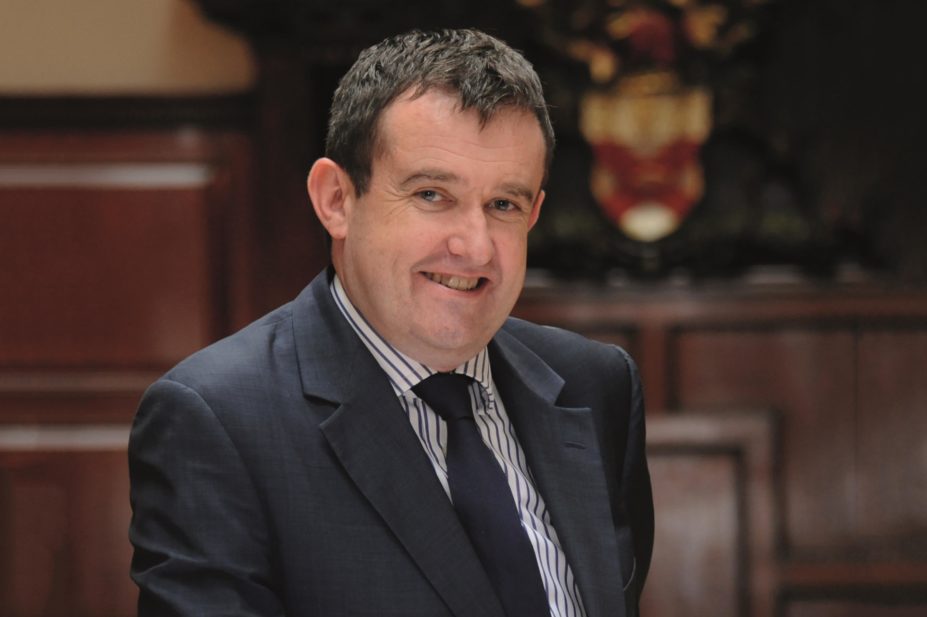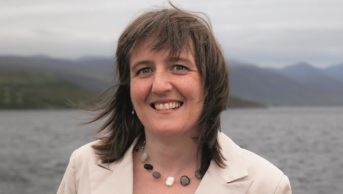
Courtesy of Paul Gallagher
The Royal College of Surgeons in Ireland (RCSI) was founded in 1784 to train surgeons. It continues to be responsible for surgery throughout Ireland and is now an institution delivering education, training and research across healthcare sciences and professions. It has its own medical school — Ireland’s largest — and offers undergraduate programmes in pharmacy and physiotherapy. It currently has more than 2,200 undergraduate students from 84 countries. It also runs postgraduate schools and faculties in nursing and midwifery, dentistry, sports and exercise medicine, and radiology, among others. It provides continuous professional development (CPD) across a range of healthcare professions, including operating the Irish Institute of Pharmacy, which was established by the Pharmaceutical Society of Ireland (PSI, the pharmacy regulator) to oversee the development and management of the CPD system for the pharmacy profession in Ireland.
Paul Gallagher is the head of the RCSI school of pharmacy. He has contributed to the reform of pharmacy education through his directorship of the National Pharmacy Internship Programme (MPharm) and helped lead the response to the tender for the establishment of the Irish Institute of Pharmacy in College for the Pharmaceutical Society of Ireland. Before Gallagher joined the RCSI in 2010, he established a pharmacy and medical centre in Dublin city centre.
Where did the idea come from for a royal college for surgeons to provide medical education beyond surgery, such as pharmacy?
Since its establishment in 1784, the college has set about educating doctors with a strong emphasis on surgery. However, in 1999 the RCSI decided to expand its undergraduate education offering into other healthcare disciplines with the establishment of the school of physiotherapy to reflect the diversity of modern healthcare professions and needs. In 2002, the RCSI school of pharmacy opened under the leadership of John Kelly. His vision was to embrace an outcomes-based approach to pharmacy education and to embrace new ways of teaching informed by scholarship.
The RCSI is not a traditional university. How is it able to award academic degrees?
Traditionally all graduates of the college received a Licentiates of the RCSI – or an LRCSI (Licentiates of the Royal College of Surgeons in Ireland). In 1978, the RCSI became a recognised college of the National University of Ireland. This meant that RCSI graduates henceforth were conferred with university degrees (MB, BCh, BAO) in addition to the traditional licence of the RCSI.
In 2010, the RCSI received designated awarding body status from the state, giving the college the power to award its own degrees.
Is there a multidisciplinary approach to the education of students from different faculties?
The RCSI has initiated several interprofessional education initiatives across its campuses, involving students of medicine, pharmacy, physiotherapy and nursing. In 2007, an interprofessional module was created for foundation year (medical and physiotherapy) and first-year pharmacy students, and a further early interprofessional education opportunity was introduced in 2008 for first-year pharmacy and first-year physiotherapy students in the form of an in-class ethics and professionalism debate.
What is the RCSI doing to help promote research in healthcare and science?
Our research strategy is to improve human health through translational research: clinical, laboratory-based and health service research informed by bedside problems, and societal and global health challenges. We promote innovative research that leads to improved diagnostics, therapeutics and devices; tackles important healthcare delivery issues; informs policy and clinical practice; and enhances the quality of education of healthcare professionals.
In 2000, the RCSI was the first to establish a clinical research centre on an Irish hospital site in our RCSI Education and Research Centre at Beaumont Hospital, Dublin.
In June 2015, we announced the RCSI’s strategic academic recruitment (StAR) programme, an initiative to accelerate the delivery of innovative, impactful research in health sciences across a range of groundbreaking work, including the creation of novel medical devices and the development of new therapeutics and new diagnostic tests.
Through the StAR programme, the RCSI invites researchers to embark in our research mission, which will see us recruit new academic posts of research lecturers. Our ultimate objective is to transfer impactful research discoveries more quickly to clinical practice for the benefit of patients.
We want to recruit outstanding candidates in research areas where the RCSI has proven strengths. These positions are in several research areas, including advanced biomaterials, stem cells and therapeutic delivery.
In 2015, the school of pharmacy (established in 2002) moved into your St Stephen’s Green headquarters in Dublin and introduced a new integrated MPharm programme. Could you tell us more about that?
In 2007, the landmark Pharmacy Act 2007 was signed into law. This primary legislation marked a step change in the regulation of pharmacy and established the Pharmaceutical Society of Ireland (PSI) as the relevant competent authority. The Act conferred significant responsibility on the PSI with respect to pharmacy education and training.
Arising from this change, a tender was issued for the operational management of the fifth year of education and training on behalf of the PSI. The RCSI school of pharmacy won the tender and commenced delivery of the National Pharmacy Internship Programme (NPIP) in September 2009, which currently leads to a Master of Pharmacy (MPharm). The NPIP marked a significant improvement in the quality of the final year of education and training and ensured that pharmacists entering the register were better equipped with the knowledge and skills for an increased scope of practice.
In July 2010, I took over from John Kelly as head of the school of pharmacy. Since then, the school has undergone a significant period of expansion and change, including the introduction of an integrated MPharm curriculum in September 2015. The MPharm is the only degree which, on successful completion, enables registration as a pharmacist with the PSI. Before 2015, students first completed the four-year undergraduate BSc (Pharm) programme at one of the three Irish schools of pharmacy. They then completed the one-year national pharmacy internship programme in order to be awarded the MPharm.
How is the RCSI involved in medical and related sectors of education around the world?
The RCSI has campuses in Dubai, Malaysia and Bahrain. Postgraduate training and education in management and leadership is provided in Dubai through the RCSI’s Institute of Leadership. In Malaysia, Penang Medical College represents a unique partnership in medical education between the Penang State government, the RCSI and University College Dublin. In 2011, the RCSI extended its educational involvement with Malaysia when it established an undergraduate medical programme in Kuala Lumpur in conjunction with Perdana University. Perdana University is hosting the RCSI five-year undergraduate medical programme in Perdana University – Royal College of Surgeons in Ireland (PU-RCSI). The first cohort of medical graduates from PU-RCSI graduated in September 2016.
In 2004, the RCSI Bahrain was established to provide undergraduate courses in medicine, nursing and midwifery, and postgraduate studies in nursing and healthcare leadership programmes. In 2009, a new campus was opened to cater for the growing number of students from Bahrain, the Gulf region and beyond.
The RCSI and the College of Surgeons of East, Central and Southern Africa (COSECSA) established a collaboration programme in 2007. The aim of the programme is to increase the provision of quality, essential surgical and emergency care in the COSECSA region, particularly at district level. COSECSA provides standardised surgical training in ten countries: Ethiopia, Kenya, Malawi, Mozambique, Rwanda, Tanzania, Uganda, Burundi, Zambia and Zimbabwe. The programme is supported by Irish Aid (Ireland’s official overseas development programme working to reduce global poverty and hunger) and the RCSI, which provides for staff and resources, including curricula, education tools, skills training, examination, accreditation and quality assurance processes.
What are the future plans for the RCSI in terms of education?
In September 2017, the RCSI will open the doors of its new academic education building (at 26–31 York Street, Dublin). The facility, due for completion in spring 2017, is the outcome of an €80m investment and is the largest construction redevelopment project in the city centre in recent years, with 120,000 square foot of space spanning ten floors. The building will be a surgical and clinical training suite containing a flexible wet lab, mock operating theatre, clinical training wards, standardised patients rooms and task training rooms. It also includes a 540-seat auditorium, a library spanning three floors with 500 study spaces, a sports hall and a fitness suite.


